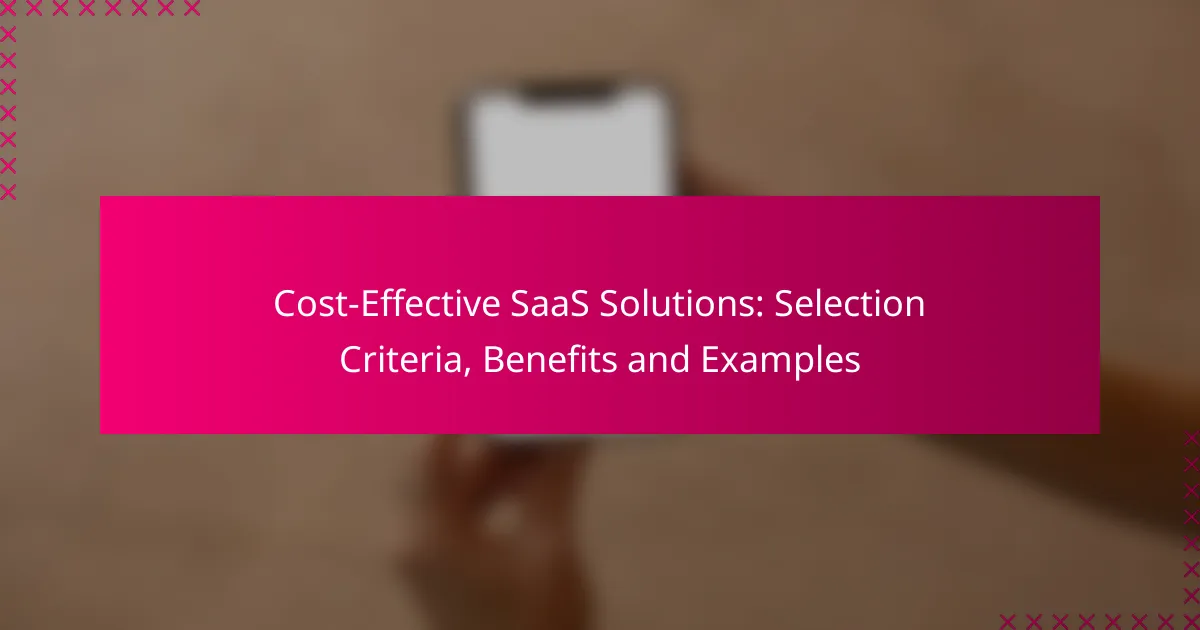Cost-effective SaaS solutions provide businesses with essential software applications through the cloud, allowing for significant savings on upfront costs and IT infrastructure. When selecting these solutions, it’s crucial to evaluate pricing, features, and customer support to ensure optimal value for your investment. By focusing on specific needs and budget constraints, businesses can leverage these tools for enhanced flexibility and improved operational efficiency.
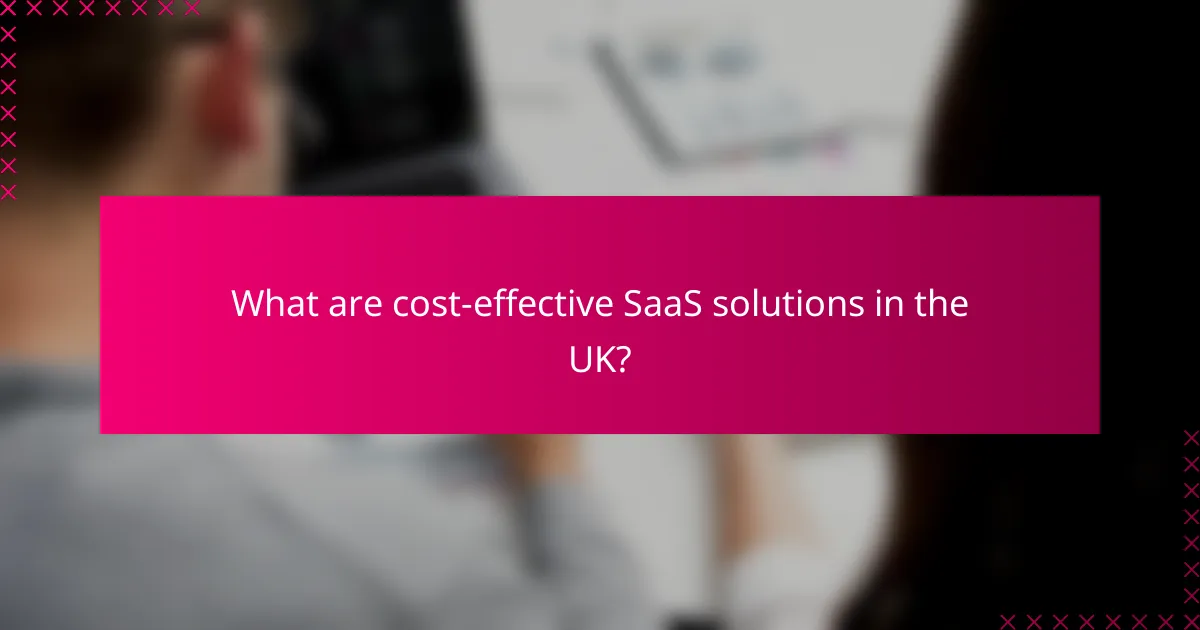
What are cost-effective SaaS solutions in the UK?
Cost-effective SaaS solutions in the UK are software applications delivered via the cloud that provide essential business functions at a lower price point. These solutions help businesses save on upfront costs, maintenance, and IT infrastructure while offering flexibility and scalability.
Affordable project management tools
Affordable project management tools enable teams to plan, execute, and monitor projects efficiently without breaking the bank. Popular options include Trello, Asana, and ClickUp, which often offer free tiers or low monthly fees, typically ranging from £5 to £15 per user.
When selecting a project management tool, consider features such as task assignment, deadline tracking, and collaboration capabilities. It’s crucial to assess your team’s specific needs and choose a tool that can scale as your projects grow.
Budget-friendly CRM platforms
Budget-friendly CRM platforms help businesses manage customer relationships and sales processes at a fraction of the cost of traditional systems. Solutions like HubSpot CRM and Zoho CRM often provide free versions or plans starting around £10 per user per month.
When evaluating CRM options, look for essential features like contact management, sales tracking, and reporting tools. Ensure the platform integrates well with your existing systems to maximize efficiency and reduce data silos.
Low-cost accounting software
Low-cost accounting software simplifies financial management for small to medium-sized businesses without the hefty price tag. Tools like Xero and QuickBooks Online offer plans starting from approximately £10 to £25 per month, making them accessible for many businesses.
Focus on features that matter most to your business, such as invoicing, expense tracking, and tax compliance. Additionally, consider the ease of use and customer support options, as these can significantly impact your accounting experience.
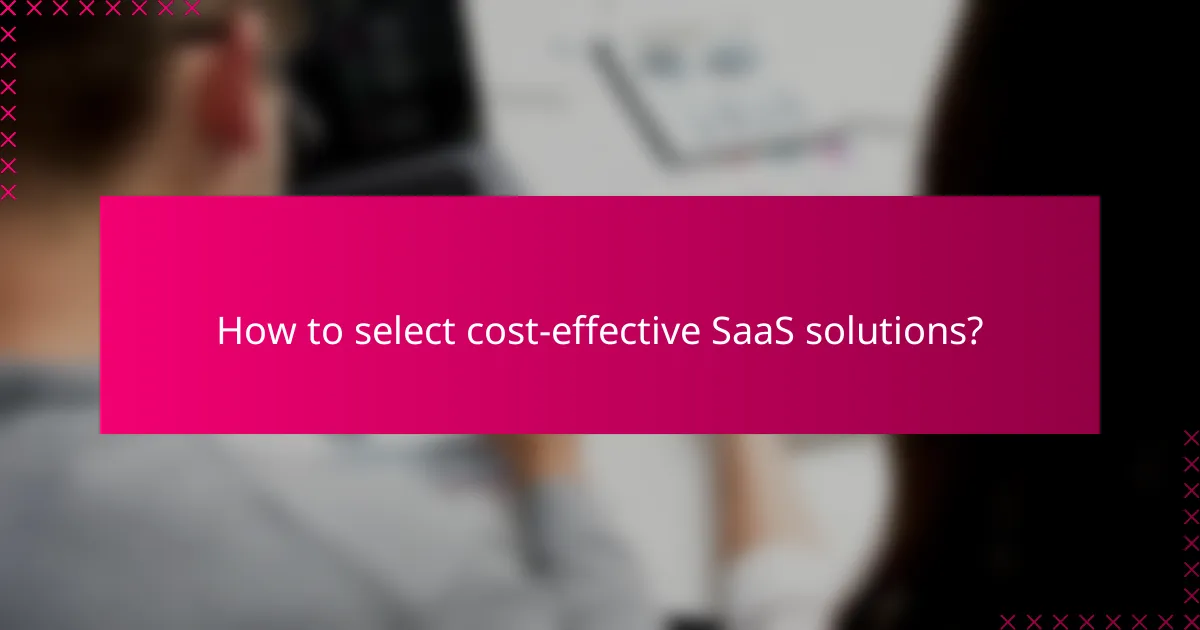
How to select cost-effective SaaS solutions?
Selecting cost-effective SaaS solutions involves evaluating pricing, features, and customer support to ensure you get the best value for your investment. Focus on your specific needs and budget constraints while considering the long-term benefits of the software.
Evaluate pricing models
When evaluating pricing models for SaaS solutions, consider options such as subscription-based, pay-as-you-go, or tiered pricing. Subscription models often provide predictable costs, while pay-as-you-go can be beneficial for fluctuating usage. Compare the total cost of ownership over time, including any hidden fees or additional charges.
Look for free trials or freemium versions to test the software before committing. This can help you gauge whether the solution meets your needs without upfront investment.
Assess feature sets
Assessing feature sets is crucial to ensure the SaaS solution aligns with your business requirements. Create a list of must-have features versus nice-to-have ones, and prioritize them based on your operational needs. This helps in filtering out solutions that may seem appealing but lack essential functionalities.
Consider how the features integrate with your existing systems. Compatibility can save time and reduce costs associated with training and implementation.
Consider customer support options
Customer support is a vital aspect of any SaaS solution. Evaluate the types of support offered, such as live chat, email, or phone support, and their availability hours. A responsive support team can significantly reduce downtime and enhance user experience.
Check user reviews and testimonials regarding the quality of customer service. Reliable support can be a deciding factor, especially if your team relies heavily on the software for daily operations.
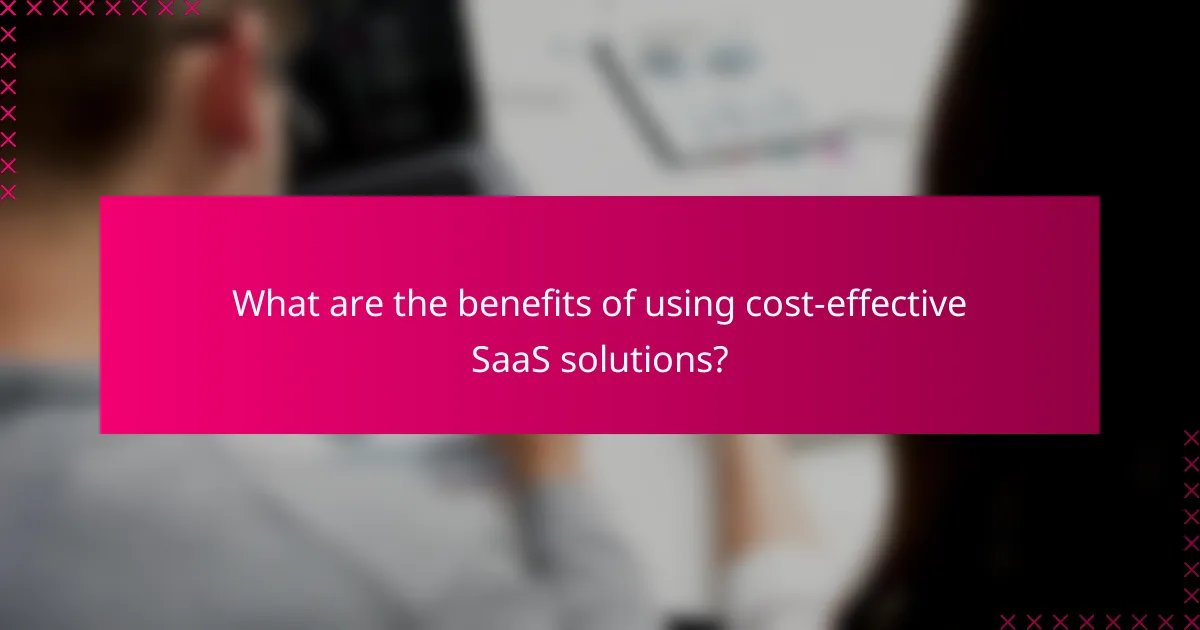
What are the benefits of using cost-effective SaaS solutions?
Cost-effective SaaS solutions offer businesses significant advantages, including lower expenses, enhanced flexibility, and access to cutting-edge technology. These benefits can lead to improved operational efficiency and a better return on investment.
Reduced operational costs
One of the primary benefits of cost-effective SaaS solutions is the reduction in operational costs. Businesses can save on hardware, maintenance, and IT staffing by utilizing cloud-based services instead of traditional software installations.
For example, companies can avoid upfront capital expenditures by opting for subscription-based pricing models, which typically range from a few dollars to several hundred dollars per month depending on the service. This allows for more predictable budgeting and cash flow management.
Scalability and flexibility
Cost-effective SaaS solutions provide scalability and flexibility, enabling businesses to adjust their usage based on current needs. Companies can easily scale up or down their subscriptions as their requirements change, which is particularly beneficial for growing businesses or those with fluctuating demands.
This flexibility allows organizations to experiment with new features or services without committing to long-term contracts, ensuring they only pay for what they use. This adaptability can be crucial in fast-paced industries where agility is key to staying competitive.
Access to the latest technology
Using cost-effective SaaS solutions grants businesses access to the latest technology without the burden of constant upgrades. Providers typically handle updates and maintenance, ensuring users benefit from new features and security enhancements as soon as they are available.
This access to cutting-edge technology can improve productivity and streamline operations, as teams can leverage the most current tools without the hassle of manual installations or downtime. Additionally, many SaaS solutions integrate with other platforms, further enhancing their utility and effectiveness.
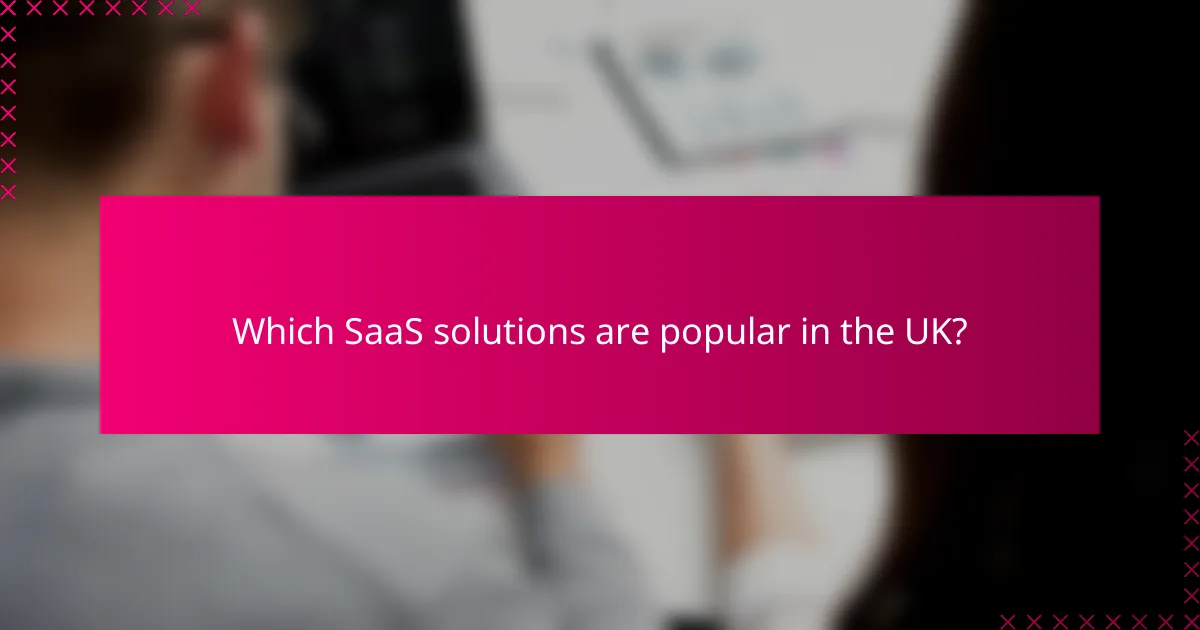
Which SaaS solutions are popular in the UK?
In the UK, several Software as a Service (SaaS) solutions are widely used for various business needs, including team collaboration, customer management, and accounting. Popular options include Slack, Zoho CRM, and Xero, each offering unique features tailored to enhance productivity and efficiency.
Slack for team collaboration
Slack is a leading tool for team collaboration, enabling real-time messaging, file sharing, and integration with other applications. It allows teams to create channels for specific projects or topics, facilitating organized communication.
When using Slack, consider setting clear guidelines for channel usage to avoid clutter. Regularly check notifications to stay updated on team discussions, and utilize integrations with tools like Google Drive or Trello to streamline workflows.
Zoho CRM for customer management
Zoho CRM is a comprehensive customer relationship management platform designed to help businesses manage their sales, marketing, and customer support efforts. It offers features such as lead tracking, sales automation, and analytics to improve customer engagement.
To maximize Zoho CRM’s potential, customize the dashboard to reflect key metrics relevant to your business. Regularly update customer information and utilize the reporting tools to identify trends and opportunities for growth.
Xero for accounting
Xero is a popular accounting software that simplifies financial management for small to medium-sized businesses. It provides features like invoicing, bank reconciliation, and expense tracking, all accessible from any device with internet connectivity.
When using Xero, ensure that all financial data is entered accurately to maintain reliable reports. Take advantage of its integration capabilities with other business tools to enhance your accounting processes and consider setting up automated invoicing to save time.
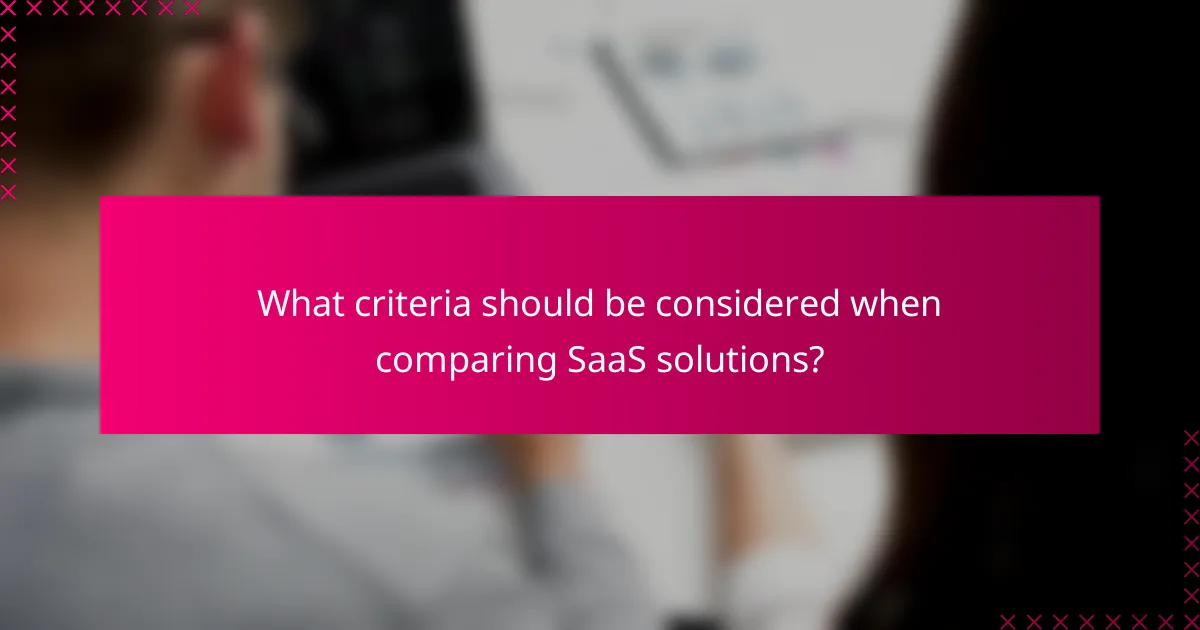
What criteria should be considered when comparing SaaS solutions?
When comparing SaaS solutions, key criteria include integration capabilities, user reviews, and overall functionality. Evaluating these aspects helps ensure the selected software aligns with your business needs and enhances productivity.
Integration capabilities
Integration capabilities refer to how well a SaaS solution connects with other software and systems your organization uses. Look for solutions that offer APIs, pre-built connectors, or support for popular platforms like Salesforce, Slack, or Google Workspace.
Consider the ease of integration and the potential need for additional resources or technical expertise. Solutions that provide seamless integration can save time and reduce operational friction, while those with limited compatibility may lead to data silos and inefficiencies.
User reviews and ratings
User reviews and ratings provide valuable insights into the real-world performance of SaaS solutions. Check platforms like G2, Capterra, or Trustpilot to gather feedback from current users regarding usability, customer support, and overall satisfaction.
Pay attention to common themes in reviews, such as ease of use, reliability, and responsiveness of customer service. A solution with consistently high ratings can indicate a trustworthy option, while a pattern of negative feedback may signal potential issues to consider before making a decision.
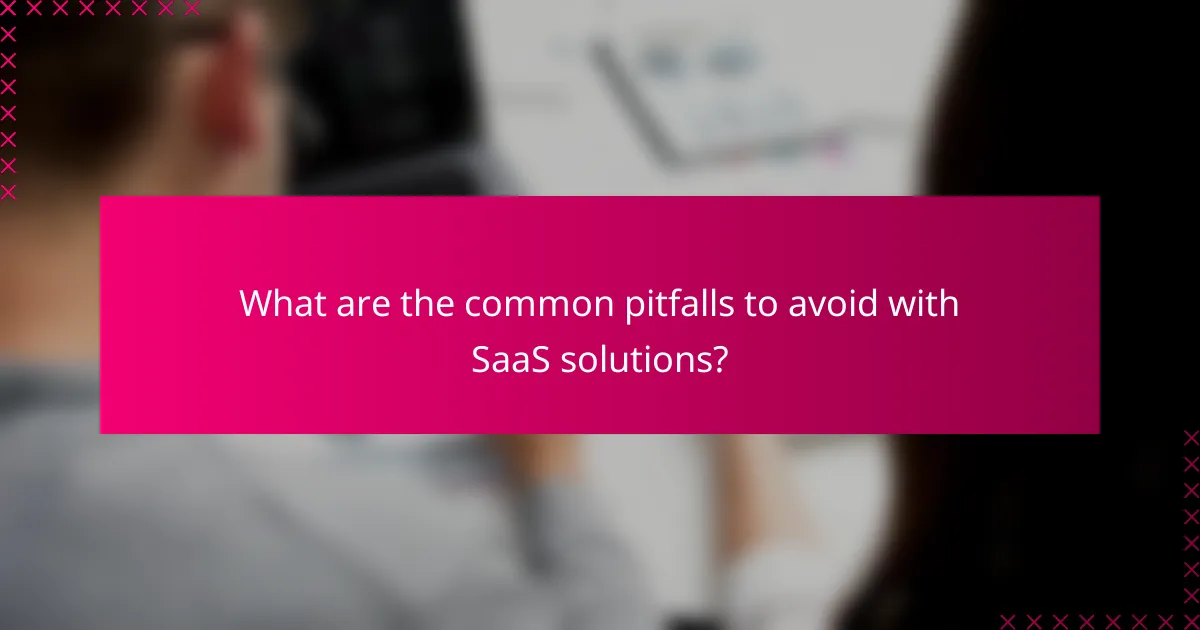
What are the common pitfalls to avoid with SaaS solutions?
Common pitfalls with SaaS solutions include overlooking hidden costs and neglecting data security measures. Addressing these issues is crucial for maximizing the value and safety of your chosen software.
Ignoring hidden costs
Many businesses fail to account for hidden costs associated with SaaS solutions, which can significantly impact the overall budget. These costs may include additional fees for extra features, increased storage, or user licenses that are not immediately apparent during the initial pricing phase.
To avoid surprises, conduct a thorough cost analysis before committing to a SaaS provider. Consider factors such as onboarding costs, training expenses, and potential price increases over time. A good practice is to request a detailed breakdown of all potential costs from the vendor.
Overlooking data security measures
Data security is a critical consideration when selecting a SaaS solution, yet many organizations overlook it. Ensure that the provider complies with relevant regulations, such as GDPR in Europe or HIPAA in the United States, to protect sensitive information.
Evaluate the security measures in place, including encryption standards, access controls, and incident response plans. Regularly review the provider’s security policies and updates to stay informed about any changes that may affect your data’s safety.
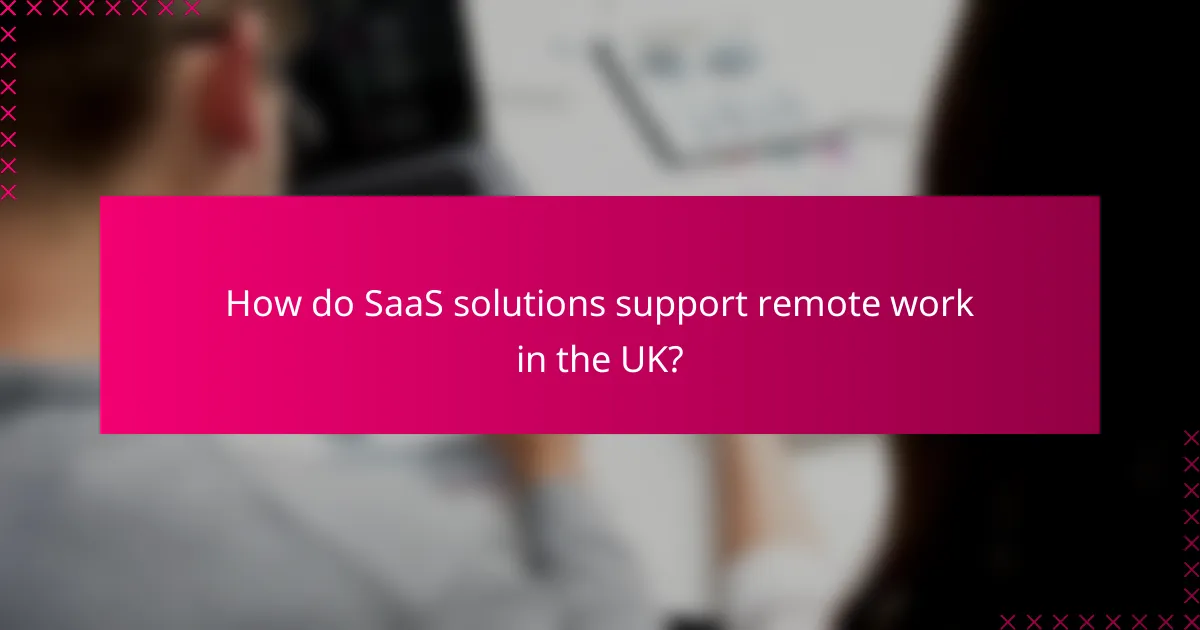
How do SaaS solutions support remote work in the UK?
SaaS solutions enhance remote work in the UK by providing accessible, cloud-based tools that facilitate collaboration and productivity. These platforms allow teams to communicate, share files, and manage projects from anywhere, ensuring seamless workflows regardless of location.
Key Features of SaaS for Remote Work
Key features of SaaS solutions that support remote work include real-time collaboration, cloud storage, and integration capabilities. Tools like document sharing and video conferencing enable teams to work together effectively, while cloud storage ensures that files are accessible from any device. Integration with other applications streamlines workflows and enhances productivity.
Considerations When Choosing SaaS Solutions
When selecting a SaaS solution for remote work, consider factors such as ease of use, scalability, and security. Look for platforms that offer user-friendly interfaces and can grow with your team’s needs. Security features, including data encryption and compliance with UK data protection regulations, are crucial to protect sensitive information.
Examples of Popular SaaS Solutions for Remote Work
Popular SaaS solutions that support remote work in the UK include Slack for communication, Google Workspace for document collaboration, and Trello for project management. These tools are widely used due to their robust features and ease of integration, making them ideal for teams looking to enhance their remote work capabilities.
